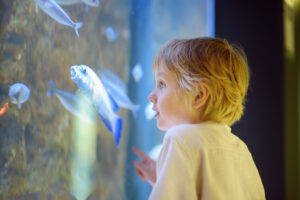How Free-Choice Learning Builds Resilience in Communities: What We Learned from Port Townsend’s Place-Based Partnership
Resilience—whether environmental, cultural, or economic—is a core aspiration for communities navigating rapid change and growing complexity. At the Institute for Learning Innovation, we believe free-choice learning is a powerful, often under-leveraged, tool to support that resilience. Free-choice learning refers to the self-directed, interest-driven learning that occurs across a range of settings, including museums, libraries, parks, and science centers. When thoughtfully designed and locally grounded, these experiences can do more than deepen individual knowledge—they can strengthen relationships, build civic capacity, and contribute to long-term community well-being.
In a recent collaboration, ILI worked alongside the Port Townsend Marine Science Center (PTMSC) in Washington to better understand the role of place-based learning in building community resilience. Through a three-year initiative funded by the Institute of Museum and Library Services (IMLS), PTMSC implemented Community Engagement in Place-Based Education, a project designed to integrate place-based learning throughout the Port Townsend School District. This work aligned with the district’s Maritime Discovery Schools initiative and engaged educators, nonprofit partners, and community leaders in developing locally relevant, inquiry-based programming.
The initiative’s goals extended beyond academic outcomes. It aimed to build teacher capacity, strengthen nonprofit-school partnerships, and deepen students’ connection to their local environment. Programs were designed to align with the Next Generation Science Standards and were offered every third year to students in grades K, 3, 6, 9, and 12.
Evaluation led by Dr. Lynn Dierking, at Institute for Learning Innovation, revealed several key outcomes with long-term implications for community resilience:
-
Sustained Community Engagement: Stakeholders across the district and nonprofit sector remained actively engaged in collaborative learning initiatives even after the funding period ended.
-
Stronger Cross-Sector Networks: Educators and local organizations developed the capacity to co-design meaningful learning experiences, enhancing the community’s ability to respond to shared challenges.
-
Increased Stewardship and Sense of Place: Students reported a greater connection to their local environment and a stronger ethic of environmental responsibility.
The project’s impact has continued beyond its initial scope. Outcomes include:
-
The creation of the Community Marine Center Collaborative, leading to new exhibitions and expanded programming.
-
The formation of the Pacific Northwest Crab Research Group, a coalition of 24 organizations (including tribal governments) conducting collaborative data collection to inform regional fisheries management.
-
PTMSC’s relocation to a new, more accessible downtown facility, expanding community access and enhancing tourism and economic development.
This case illustrates how free-choice learning—when intentionally designed and rooted in local context—can serve as a mechanism for building more connected, adaptable, and resilient communities. It reinforces the importance of viewing learning as a shared civic responsibility, not limited to formal education settings. As communities across the country confront complex and interrelated challenges, it is critical to invest in models that foster collaboration, deepen local knowledge, and empower individuals across sectors. Free-choice learning is a community resilliancy strategy, and one that is proving to have lasting impact.
Posted Apr 17, 2025

